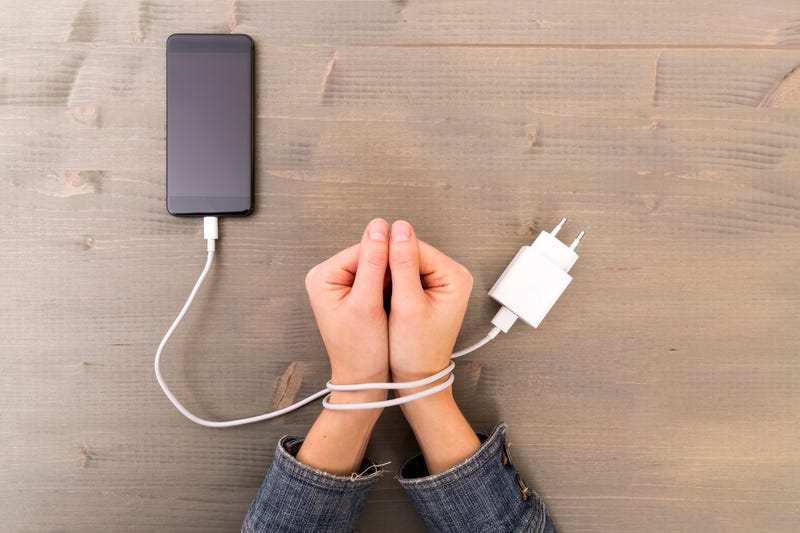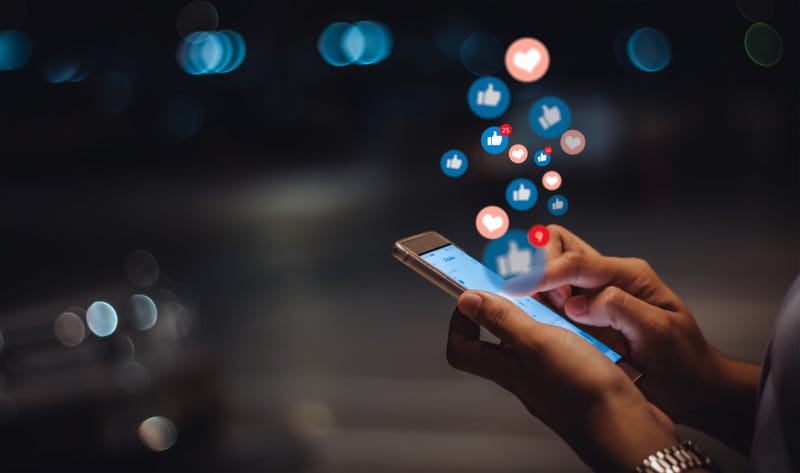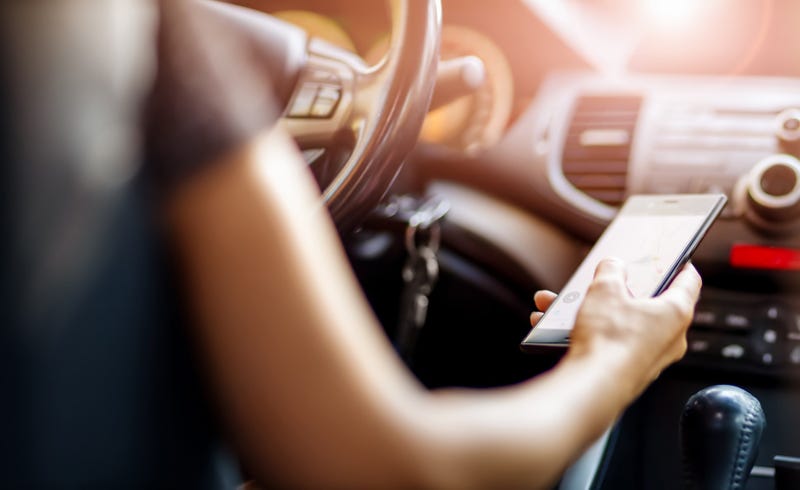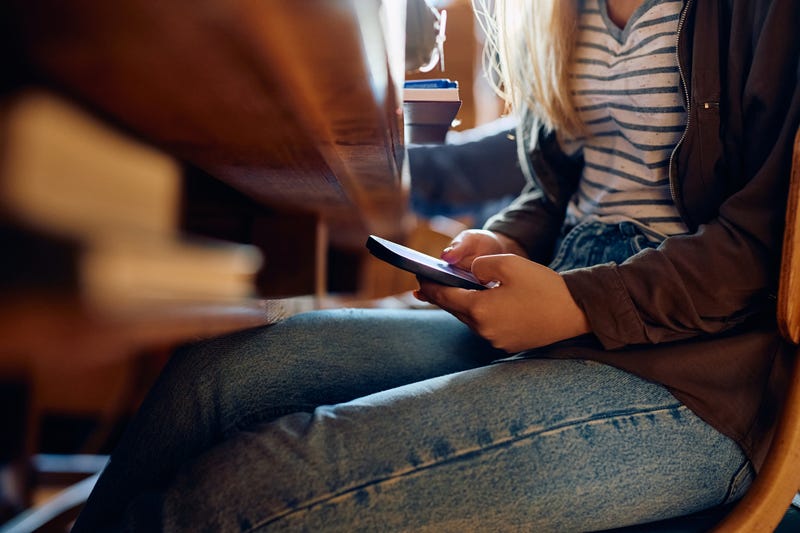
How did you feel the last time you temporarily misplaced your phone? Panic comes to mind for many as these devices have become so integral to our lives that we can't imagine a day, or even a few minutes, without them.
In this month's "A Closer Look with Laura Oakes," she dives into the research and sometimes upsetting realities of our digital dependence.
"Something's happening to our kids."
"As one Gen Z poet put it, we know that it's poison, but we drink anyway."
"All of a sudden, people who saw addiction as a problem that somebody else had, began wondering about their own compulsive consumption of digital media."
There are just as many expert opinions as avenues to explore when it comes to the power our digital devices have in our lives. And perhaps some of the misunderstanding, shaming and defensiveness that can go along with it.
It goes beyond parking children in front of a tablet or smartphone at a restaurant. It goes beyond melting into the couch as you look up to realize you've been falling down the TikTok rabbit hole for close to an hour. Our ever-present phones are - and have been for some time - fundamentally changing how we function in everyday life. How we drive, go to school, sleep, shop, feel and treat ourselves and our bodies.
A recent study showed 83% of Gen Z respondents admit having an unhealthy relationship with their phones. Others show most people -regardless of age - check their phones an average of 80 times per day, or 12 times an hour, and 89% are on their phone within the first 10 minutes of waking up. Many take their phones with them to the toilet, and are extremely uncomfortable and anxious if they happen to forget their phone at home.
How did we get like this?
Roxanne Prichard is a professor of psychology with a background in neuroscience at the University of St. Thomas in St. Paul.
"In our palm, we have things that both activate our fight or flight response and stress us out," says Prichard. "And also, our way to do 'tend and befriend,' comfort us, pass the time in fun ways and look at pictures. So it's a source of both stressful events and access to stressful events all around the world. And also, a tool that helps us connect with people far, far away, and a tool that helps us listen to beautiful music and make cool art. So it's really ubiquitous."
But bestselling author, motivational speaker and podcast host Mel Robbins isn't quite so nice about it in her recent episode titled "How to Stop Screwing Yourself Over."
"We live in what's called the attention economy," describes Robbins. "Now, what does that mean? Here's what it means. It means your attention is for sale. That the time you spend watching media, scrolling through your phone, tapping on certain things, buying things that you don't need, everybody is making money off of your attention and your time. That you don't have to get on your phone and buy something for people to make money. You simply sitting on your phone and mindlessly scrolling and having it on, people have figured out how to make money with you simply having the phone on. And so takeaway number one is that your phone is designed to steal your attention for one reason and one reason only: because people are making money on you. It's that simple."
Robbins believes the key is to think of our phone as a tool, not becoming the tool by which big tech and forces larger than ourselves are able to manipulate our attention and focus.
But for as many negatives as there are like what Robbins is talking about, there are many undeniable positives: The connection our phones allow us with people anywhere in the world, instant information at our fingertips, the ability to do aspects of our work, order a ride or some lunch, or even balance our bank account from pretty much anywhere.
The list goes on.
In the negative column, we find addiction, social comparison, serious challenges to our attention spans and focus, and the hit to our sleep - another of Professor Prichard's specialties.
"Smartphones, media, tablets, all those things can impact sleep three ways," says Prichard. "Number one, just the light from them often has short wavelength light, which happens to be that blue light that's the color of the sky, that just happens to be the exact right wavelength of light to tell our eyes to tell our brain not to go to sleep yet."
“Another thing is just time displacement, like, 'oh, I went to go to bed, but let me just see if I can solve the Wordle, the spelling bee, do another whatever, watch an episode, check Pinterest,' right? So it's just time that could have been spent going to bed is now spent doom scrolling, etc."
"And then the third piece is going to be something that's a little trickier called emotional activation. So when it's time to go to bed, I should be relaxing. I should be winding down. I should be really kind of putting away the cares of my day. Now if I go check the news, I am not relaxing and I am activating and my stress responses is going up and my heart rate's increasing, and I'm finding more things to worry about and that makes it hard for me to go to sleep. So, with teens, it's even more stressful because the teen brain is still developing, and they have sort of an outpaced social brain that's really interested in what other people are thinking, if other people have liked or commented or connected. And their prefrontal cortex, the part that can delay gratification and think about things in a bigger context, is still developing. So things feel more intensely to the social brain, and they're less equipped to problem solve. So you can have an innocuous comment or something be interpreted the wrong way and set somebody off for hours at night."
And yet, Prichard does not call it an addiction.
"I wouldn't say addicted. I mean, I think they'll clearly say, 'yes, it's a problem for me, as your research said,' but also this is the way they work, right? I say in my classroom all the time, 'here's a QR code, do this survey.' I'm just expecting the device to be an appendage, and all their schoolwork is through learning management systems, and really it would be hard to interact unless it was sort of a structured camp-like setting where nobody has phones.”
“But do you think that they appreciate and see the benefit in not having a phone on them at all times?” asks Oakes.
“They do. They do. But they also see that that's not a realistic world that they're living in."

What is that world?
Sally Hite is a 23-year old recent college graduate.
"Yeah, so I think a lot of our daily lives depend on it, like checking the weather or just seeing what's going on in the world," she explains.
Hite and many other young adults are responsible with their phones, having learned to police themselves over the years. Hite sets screen time limits for herself and turns her phone off at bedtime.
Yet the science behind addiction for those who do struggle - particularly with social media - is real. And it’s all about the notion of uncertainty.
Jean-Marie Maddux is an assistant professor of psychology and neuroscience at Macalester College in St. Paul.
"We tend to find uncertain events very motivating," Maddux says. "Similar to other addictive substances, uncertain events can activate the brain’s dopamine reward pathway. And if you think about it, social media is a great example of uncertainty. You never know if you're going to get a like or if you're going to be rewarded with an interesting photo or some interesting piece of information. Or if someone is going to comment positively on your post. They may, they may not. And even if they do, you never know exactly when that social reward is coming."
“So this is similar in some ways to gambling, which we know can be addictive," Maddux continues. "If you think about most gambling games, there is a possible payoff, but it's certainly not guaranteed, and we know that people can find that sort of uncertainty very thrilling, very motivating. They stay motivated to keep playing the game or keep gambling. So, you can see with social media how it can become quite easy to constantly check your phone because you're never quite sure when you're going to be rewarded."
Social media companies know this and capitalize on it by designing their platforms with “infinite scrolling.” It’s the scroll function that allows content to continuously populate, rather than having a page eventually end at some point. The goal? To keep users scrolling, increase their time on the platform, and expose them to more and more content, advertising and ultimately, distraction.

What about phones in the car?
One of the biggest real world examples of our inability to put down our phones lies behind the wheel. It’s such a problem that in 2019, Minnesota implemented a “hands-free” law, which makes it illegal to hold a phone in your hand while driving. Almost every U.S. state or territory has a hands-free law or bans on texting. Montana is currently the only state that doesn't have restrictions on phone use in place.
Mike Hanson is Director of the Office of Traffic Safety within the Minnesota Department of Public Safety.
"We did fine-tune it a bit in 2023 to make it absolutely, positively, 100% clear the phone can't be in your hand at all when you are behind the wheel," Hanson said. " You can interact with it, but only if you're using a single touch or voice activation."
Research from the University of Utah tracked what happened to drivers in driving simulators when they were distracted by technology, like their phone receiving texts. It found their level of impairment was very similar to being drunk, and the numbers are staggering - distracted driving is responsible for one in five car accidents nationwide.
That's also true in Minnesota according to Hanson.
"The numbers are - they're stark," he says. "They're scary, really when you think about it. Just for instance, preliminary stats show in 2024 alone, at least 29 deaths are directly attributed to a distracted driver. That's 29 families that have an empty chair at the Thanksgiving table, an empty chair at those Christmas gatherings and things like that. Families that had to plan a funeral instead of a celebration."
"One telematic study that I'm familiar with showed that when you look at crashes and what the driver was doing immediately preceding that crash, over 30% of those are attributed to phone interaction or electronic device interaction," he continued.
Hanson says law enforcement issued 27,000 tickets to drivers violating Minnesota's hands-free law last year. On a recent Tuesday ride along, Minnesota State Trooper Mike Lee was able to spot a driver with a phone in her hand within four minutes.
"I spoke to her. She was very polite. She admitted that she was using her phone for GPS purposes and the GPS was pulled up," Lee said after the stop.

What about in school?
Regardless of whether our phones are good or bad- or both - for us, Minnesota schools are getting involved with legislation that would ban K-8 students from being on their phones at all during the school day, and limit the amount of time for high school students. There's strong awareness at the preschool level too. Christy Kujawa is a licensed parent and family educator with Minneapolis Public Schools with a special area of focus on media, technology and early childhood neuroscience.
"For sure we want to make sure that actual play with things that are not electronic stays a part of kids’ lives," Kujawa explains. "There's so much learning that happens through play, through creative play, imaginative play like role-playing, like,, you know, ‘you be the firefighter and I'll be the person in the burning house’. Whatever it is, there's so much that happens for kids in terms of building empathy when they can put themselves in those different scenarios. It's just not the same when you're watching an episode of something as when you're acting it out yourself at (age) four, five, six.”
“But then as they get older, there have been movements. I do think that our teens are starting to understand how detrimental it can be to be completely locked into a screen. And there have been kids signing off themselves,” Kujawa says.
Despite the sea of research, legislation, school rules, and social pressure, might resisting the constant lure of our phones come down to personal responsibility?
If so, there’s hope, at least when it comes to our young adults.
"When I'm really trying not to be on my phone, I'll pick up a book or find another task that helps me stay distracted from my screens," says Sally Hite.
